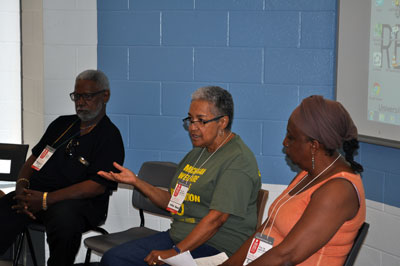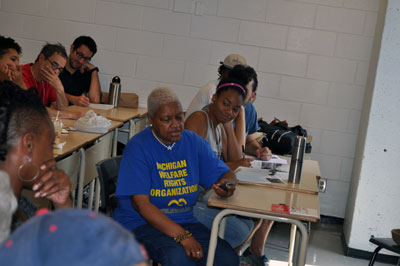

The League of Revolutionary Black Workers (August 10, 2016)
This was a very inspiring workshop with factory workers and members of the League of Revolutionary Black Workers in Detroit in the 1960s and 1970s. They are making a documentary on this group. Donate at revolutionaryblackworkers.org.
Jerome Scott: Importance of workers at point of production. Detroit under lockdown, except if you were on your way to work. Taught them a lesson: how important workers are at point of production. Expansive operation. Black Star printing. Importance of reparations. Internationalism: contact with Palestinian struggle since 1960s. Figure out base and concentrate on base, but then work on that to be as broad as possible. Importance to educate ourselves, to understand capitalism. Need solid base in theory and relate it to our practice in order to survive.
Marian Kramer: Black Peoples Liberation Army. Importance of print shop. Working conditions in factory: didn't need to go to Vietnam to get killed, could get killed in factory. 12 hrs day, 7 days a week. Newsletter was a great organizer. Need to understand objectively when we do certain things, otherwise you just get yourself hurt. Need for political education. Need base of operation. Police not protecting us, but of ability of factories to produce.
DRUM: Dodge Revolutionary Union Movement
FRUM: Ford Revolutionary Union Movement
Organizing within schools. Set up committee of women to go talk to people to explain what we are doing. Factories needed nurseries so women could work. League developed with women struggling within league, because women were publishing newsletter. Took energy to community, and they needed to learn these skills as well. League is not of one person, but of many peoples' participation.
Rose Brewer: Need to know these names, because otherwise these histories disappear. Importance of stories: workers at point of production, and if they shut down society would shut down. Need to know this history. A couple important points:
1. importance of political education. They were studying Capital and dense theory. We need to push ourselves. Need both theory and action. It's a challenge to put the time and energy necessary to understand these struggles.
2. long haul. political sacrifice. Not instant.
3. building institutions, based in community.
Living in time of changes in global capital when system is undergoing change.
Miriam: connection with Panthers (Bobby Seals, Cleavers). They wanted to build a Panther party in Detroit. Took them to rent strike in public housing. We helped Panther party to grow. Problem of infiltration into party--told them what to look out for. Fighting for society for grandkids, don't be selfish and stop now.
Maureen: Throwing rocks, but saw that had something to learn (about political organization). Fight for social justice brought form to struggle.
 Jerome: writing: we did it together, and wrote it in our own language. Not like 1970s when people went into plants. Focused on health and safety, because Black workers had most dangerous jobs.
Jerome: writing: we did it together, and wrote it in our own language. Not like 1970s when people went into plants. Focused on health and safety, because Black workers had most dangerous jobs.
Miriam: But lesson is that we all have to do it collectively. We can draw on our communal strengths. Build new leaders through collective. Don't build superstar (no one is indispensable). We are all leaders. If you didn't know how to read, you learned in the collective. same with writing.
Black Nationalism: couldn't get rid of them. Some of us came out of that. Not trying to become part of society. That's not for us. We began to understand who were our friends. Charged with dual unionism, but said that they were doing what they should have been doing. Coalition of Black Trade Unionism. A lot of folks didn't like us, but forced to deal with us. Gained respect through practice.
Jerome: knew that they were being exploited. How does Black Nationalism end exploitation, if it just wants to be part of exploitative capitalist system. That question would break nationalists back: what is vision, where are we going? If future doesn't eliminate exploitation, we need to move on to another one.
State: they are always going to find someone to infiltrate organization. How are we going to block problem? Solution: if you join, you will work. Infiltrators would talk crap, but not do work. Never accused people of being agents, but held people to task. Infiltrators leadership: but had to earn right of leadership. Wouldn't stop state, but people had to earn right to be there.
Miriam: letters from FBI to try to destroy people.
Jerome: Wildcat strike--not organized through union that gives capital time to organize. unions furious because they had no control. But also pro-union. We needed to strengthen union, rather than let it evolve into what it currently is. Problem when union took in more money from investments than dues, because then it could abandon workers. Union president Doug Fraser went on board of Chrysler. Tremendous unity. When there is a contract between union and workers and it is broken on safety issues, you have right to walk.
Political education and Capital: difficult to understand, not easy. Can't go into studying without dedication to longterm. Need relationship to history, politics, culture. Have to be attuned to changes in capitalism, as important as change from agriculture to industry, to understand current change from industry to electronics. When factors produce more commodities with less labor--need better grasp of political economy to understand changes in country. Most important thing was to figure out examples in our lives.
Miriam: and raising families while this is all going on. Fought male supremacy. Appreciation for family. Surprise that we survived--in & out of jail.
Jerome: start political study from day one, to understand world as it is now and how it is changing. Need political education now.
Rose: Praxis.
Jerome: no matter who you are approaching, you need to approach them from where they are.
Miriam: education and exercise, to keep ourselves as healthy as we can
General Baker Institute. Miriam's spouse. Father brought family to Detroit to work in factory. Organized demonstration against Vietnam draft, but they let him go. Teacher. Studied at Wayne State and then went into factory at Dodge Main. Went to Cuba (1966), met Robert Williams. Died May 2014.